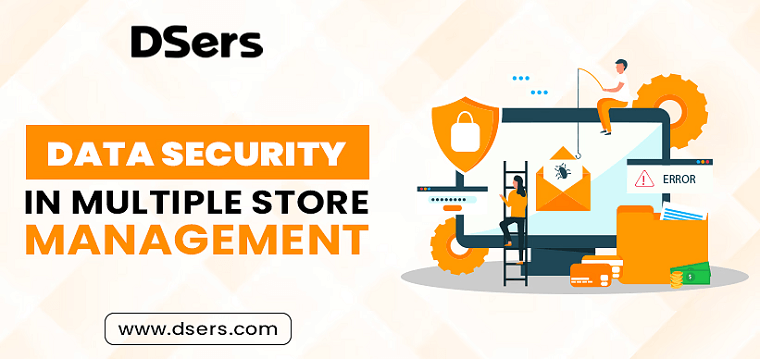Data Security and Compliance in Multi-Store Management: Ensuring Customer Trust

The ability to effectively manage multiple stores is essential for e-commerce success whether you own an e-commerce platform, franchise, or store. But this authority also carries a heavy burden: making sure data is secure and that regulations are followed.
When making judgments, 83% of risk and compliance professionals view maintaining compliance with applicable laws, policies, and regulations as either extremely vital or crucial. We will explore the nuances of data security and compliance in multi-store management in this extensive blog, with an emphasis on how they support establishing and preserving consumer trust.
What Is Data Security
The process of protecting digital information from unauthorized access, disclosure, alteration, or destruction at any point in its lifespan is known as data security. To defend data against potential threats like hackers, viruses, physical theft, and unintentional loss, entails putting strong frameworks of safeguards, regulations, and technology in place. It is impossible to exaggerate the significance of data security since it is the cornerstone of upholding consumer confidence and protecting private data.
Why Data Security Matters
Data Security matters in today’s multi-store management. There are several reasons:
Protection Against Threads
Cyber threats are on the rise, and this puts organizations and stakeholders in danger. Cyberattacks, data breaches, and security events can have serious repercussions, such as monetary losses, legal obligations, and harm to one's reputation. Cybercriminals, hostile actors, and hackers target businesses regularly to steal confidential data and take advantage of weaknesses. Businesses may strengthen their defenses and reduce the dangers posed by potential attackers by giving data security measures top priority.
Legal and Regulatory Compliance
Businesses must comply with data protection rules and regulations in an increasingly complicated regulatory environment. Governments throughout the world have passed strict data privacy laws to safeguard people's rights and control the use of personal data. For instance, the European Union's General Data Protection Regulation (GDPR) places stringent limitations on how businesses gather, use, and retain personal information. If these rules are broken, there may be steep fines, legal repercussions, and reputational harm to the organization. As a result, maintaining data security is not just a moral obligation for companies functioning in the current regulatory environment, but it is also required by law.
Confidentiality and Trust
Businesses get sensitive information from customers, clients, and stakeholders, and they expect it to be handled carefully and confidentially. In addition to jeopardizing people's privacy, data breaches damage the impacted organization's credibility. A single security breach can have far-reaching effects, harming the company's standing with stakeholders and consumers as well as its reputation. Businesses may show their constituents that they are committed to safeguarding sensitive information and maintaining their confidence by putting strong data security procedures in place.
Competitive Advantage
Businesses can get a competitive edge in the market by implementing data security measures. Customers give security and privacy top priority when selecting products and services at a time when security incidents and data breaches are commonplace. Companies that make significant investments in data security strategies set themselves apart from the competition by becoming dependable and trustworthy partners. Furthermore, maintaining strict adherence to data security certifications and standards can boost the organization's reputation and draw in discriminating clients who value data security.
Business Continuity
Maintaining the resilience and continuity of corporate operations depends on data security. Business operations may be interrupted by a security event or data breach, which could result in lost revenue, operational inefficiencies, and downtime. Through proactive implementation of data security measures, enterprises may reduce the likelihood of disruptions and protect their vital resources. Furthermore, firms can improve resilience and business continuity by swiftly recovering from security incidents and minimizing the impact on their operations when they have a strong data security posture.
What Is the Compliance in Multi-Store Management

Standards for compliance offer direction for safeguarding information and guaranteeing adherence to regulations. Important guidelines include the cybersecurity and privacy frameworks from the National Institute of Standards and Technology (NIST), the Federal Risk and Authorization Management Program (FedRAMP) for cloud services, the Payment Card Industry (PCI) compliance for companies that handle credit card data, the ISO 27001 and ISO 27032 standards for information security management and cybersecurity, the data protection and risk management guidelines from the British Standards Institution (BSI), and the Internet Engineering Task Force (IETF) protocols for secure communication.
How Companies Enhance Data Security
Data security is made more difficult and complex when managing many stores in different locations. To secure confidential data and reduce risks, companies need to put strong data security best practices into place that are specific to managing multiple stores. The following are some crucial tactics and methods to think about:
Access Control
Data security is based on access control, especially in multi-store management environments where different users can need different levels of access to critical data. Restricting access to sensitive data according to roles, responsibilities, and the least privilege principle is made easier by putting strong access control systems in place. Take into account these recommended practices:
- Role-Based Access Control (RBAC): Assign users roles and permissions following their organizational responsibilities. Restrict sensitive data access to only those who need it to carry out their job duties.
- User authentication: To confirm the identity of users gaining access to the system, utilize robust authentication techniques like multi-factor authentication (MFA). To improve security, make users verify themselves with various factors, including passwords, fingerprints, or security tokens.
Encryption
In multi-store management environments, where data may be sent across networks and kept on multiple devices, encryption is crucial for safeguarding data both in transit and at rest. Businesses can make sure that data is unreadable and unusable even if it is intercepted or viewed by unwanted people by encrypting it. Think about the best practices for encryption listed below:
- Transport Layer Security (TLS): To protect data sent over networks, including Wi-Fi networks, internet connections, and internal communication channels, use TLS encryption. To encrypt data in transit and guard against manipulation and eavesdropping, use robust TLS settings.
- Information at Rest Encryption: To prevent unwanted access, encrypt sensitive data kept on laptops, servers, databases, mobile devices, and other storage media.

Regular Audits
In multi-store management setups, regular security audits are crucial for finding vulnerabilities, determining compliance with rules and standards, and analyzing how well data security solutions are working. Periodic audits assist in identifying security flaws and putting the required corrective actions in place to improve the security posture. Think about the following excellent practices for audits:
- Vulnerability Assessments: Conduct frequent vulnerability assessments to find gaps in the multi-store management systems, apps, and infrastructure. Prioritize remedial efforts by identifying vulnerabilities using automated scanning technologies and manual assessments.
Conduct compliance audits to evaluate whether multi-store management is in conformity with applicable data protection laws, regulations, and industry standards. Make sure that your data security procedures cover any gaps or inadequacies found throughout the audit process and are in compliance with regulatory standards.
Incident Response Plan
For multi-store management settings to efficiently detect, respond to, and mitigate data breaches and security incidents, a thorough incident response plan must be developed. Procedures for identifying security issues, alerting stakeholders, containing the issue, doing forensics investigation, and returning to regular operations are outlined in a well-defined incident response plan. Think about the best practices for incident response listed below:
Implement methods for identifying security incidents, such as user activity monitoring tools, intrusion detection systems (IDS), and security information and event management (SIEM) systems. Provide staff with explicit reporting guidelines so they may swiftly report any suspected security incidents.
Employee Training
In multi-store management environments, employee awareness and training are essential parts of a comprehensive data security plan. Inform staff members about compliance standards, best practices for data security, and their part in protecting sensitive data. Think about the recommended strategies for employee training listed below:
- Security Awareness Training: Hold frequent training sessions to inform staff members about phishing scams, social engineering methods, common security dangers, and safe computing procedures. Employees should be empowered to identify and quickly report security incidents.
- Role-Specific Training: Customize training curricula to address particular positions and duties in the company, offering focused instruction on incident response methods, access control guidelines, and data management practices. Make sure staff members are aware of their responsibilities for data security and compliance.
Why Choose DSers Multiple Store Management
DSers' Multiple Stores Management presents a holistic solution tailored for the efficient management of numerous stores across diverse locations. Whether you operate an e-commerce platform, retail chain, or franchise, DSers offers a suite of features designed to streamline your multi-store operations.
Covering aspects such as inventory management, order processing, analytics, and reporting, DSers facilitates seamless coordination and optimization across your expansive network of stores.

|
Manage Multiple Stores In One Account Multiple Stores Management - Link and manage multiple stores on different platforms in one place |
Summary
Data security and compliance in the context of multi-store management are non-negotiable. Protecting sensitive data must be a top priority for businesses, and they must also follow industry and legislative requirements. Businesses may secure the long-term viability of their operations, preserve and grow customer trust, and safeguard their brand by putting strong data security procedures in place. Recall that safeguarding people and their privacy is equally as important as protecting data. Businesses may prosper in today's linked digital environment while building trust and confidence among stakeholders and customers by taking a proactive approach to data security and compliance.











 Company
Company
 Why Choose DSers
Why Choose DSers
 Blog
Blog
 Help Center
Help Center




 Live Chat
Live Chat